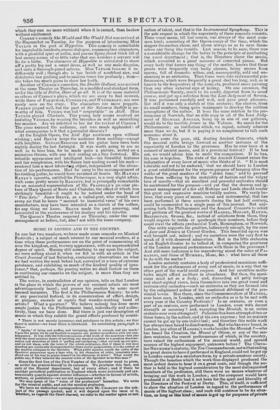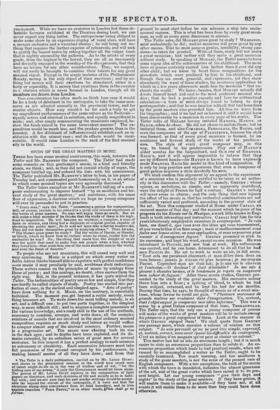MUSIC IN LONDON AND IN THE COUNTRY.
IN our last two numbers, we have made some remarks on Musical Festivals ; a subject of much interest to our musical readers, at a time when these performances are on the point of commencing all over the kingdom, and, to every appearance, with an unprecedented degree of spirit. Having still something to say upon the subject, we were setting about it, when we fell in with an article in the Court Journal of last Saturday, containing observations on what we had written the week before last, conveyed in a tone of extreme petulance, and exhibiting so much of the kindred quality of igno- rance,* that, perhaps, the passing notice we shall bestow on them in continuing our remarks on the subject, is more than they are
entitled to. •
The writer, in contradiction of our opinion, tells us that London is the place in which the powers of our eminent artists are most advantageously heard ; and proves his position by some most learned instances. The first is the Philharmonic Society: he asks if any provincial festival, in its concentration of effort, design, or purpose, exceeds or equals that wonder-working band of artists? What a question ! We believe nobody has done more ample justice to the Philharmonic band, individually and collec- tively, than we have done. But there is just one description of music in which they exhibit the grand effects produced by combi- • There is not merely ignorance and petulance in this article ; we fear there is malice—we know there is falsehood. Its concluding paragraph is this- , " Again,' of lying, and puffing, and intriguing, there is enough, and too much.' Upon this point, we do not hesitate to express our perfect accordance with our con- temporary. It was with the fullest assurance of the truth of the assertion—but also with the most anxious desire of assisting our musical readers to a prudent discrimi- nation and detection of what is 'puffing and intriguing,'—that we took up our pen; and we tell them, with the voice of the whole profession, that if there is one man standing pre-eminently distinguished for these useful propensities, it is the author of the musical critiques in the Spectator. What public opinion would the critic of the Spectator pronounce upon a man who, in his character of critic, invariably wan- dered out of his way to praise himself in his character of artist? What would the public say, if they believed the musical critic of the Spectator to be /hat man ?"
Since the first line of the First Number of the Spectator went to press, tio writer has praised himself in its columns. We proclaim this fact, not only of the Musical department, but of every other; and if there be another periodical publication in England which more anxiously and sys- tematically guards against sinister influence—whether in favour of artists, authors, or publishers—we are not acquainted with it. We may speak of the " voice of the profession" hereafter. We write for the musical public, and not the musical profession. We have an unfinished correspondence with Mr. COLBURN on the sub- ject of the passage quoted; and it will depend upon the issue of it, whether, as regards the Court Journal, we refer to the matter again or not. nation of talent, and that is the Instrumental Symphony. This is the sole respect in which the superiority of these concerts consists. Their vocal music, till last season, was always of the most com- mon kind; consisting of .the Opera-songs of the time, which the singers themselvei chose, and. chose always so as to save them- selves any thing like trouble. Last season, to be sure, there was a considerable change for the better in the principle of conducting the vocal department ; that is, the Directors chose the music, which consisted in a great measure of concerted pieces. But every body that knows any thing of the matter, knows that these pieces were frequently very badly chosen, being scenes from operas, full of dramatic action, and, consequently, cold and un- meaning in an orchestra. Then there were solo instrumental per- formances, which were frequently a great deal too long, and, as is known to the frequenters of the concerts, produced more yawning than any other external sign of feeling. On one occasion, the. Philharmonic Society, much to its credit, departed from its usual course, and got up a selection from the Last Judgment of Spotlit. It was performed carefully and well, and gave great pleasure. But still it was only a sketch of this oratorio ; the chorus, from its small numbers, being quite inadequate to develop the sublime conceptions of the author. It bore the same relation to the per- formance at Norwich, that an able copy in oil of the Last Judg- ment of MICHAEL ANGELO, hung up in one of our galleries, would do to the terrible fresco in the Vatican. So much for the Philharmonic ; an institution which, we repeat, nobody admires more than we do, but it is paying it no compliment to talk such nonsense about it.
Then come the poor, old, doating Ancient Concerts, which this musical critic brings forward as another instance of the superiority of London to the provinces. Has he ever been at a concert of ancient music, and at a provincial festival ?. If he has not, we would advise him to make the comparison. If he has, his case is hopeless. The state of the Ancient Concert raises the indignation of every lover of music who thinks of it. " It is most tolerable and not to be endured," that we should have in London a great establishment for the express purpose of keeping alive the works of the great masters of the " olden time," and to prevene them from suffering by the mutability of fashion and the vulgar love of novelty—that an excellent and powerful orchestra should be maintained for this purpose—and yet that the drowsy and ig-' norant management of a few old Bishops and Lords should render this great and expensive .machine totally useless.. We verily be lieve, that every piece of music, vocal and instrumental., that has been performed at these concerts during the last half century,, could be enumerated in a single page of this journal. But sup- poSing.hoth the Philharmonic and the Ancient Concerts to select and perform all the greatest works of HANDEL, MOZART,. HAYDN, BEETHOVEN, SPOHR, &c., instead of selections from them, they would require to treble or quadruple their numbers, before they could rival the effects produced at York, Birmingham, or Norwich. Our critic supports his position, ludicrously enough,' by the case' of Azor and Zemira at Covent Garden. This beautiful opera was well brought out, indeed ; and we ourselves were the very first to speak of it with deserved admiration. But is the little orchestra of an English theatre to be talked of, in comparing the greatness of the London musical performances with those in the provinces ?. And still more ludicrous is his maundering about the solos 'of PA-. GANINI, and those of Hummel., Mom, &c. : what have all these to do with the matter?
London certainly contains a body of professional musicians suffi- cient for the performance of every sort of music, in a way that no other part of the world could surpass. And her countless multi- tudes might afford auditors in abundance. But then, the musi- cians must act as a body ; and, discarding all petty feelings and short-sighted views, form themselves into one great vocal and instrumental orchestra—such an orchestra as they are formed into by the enlightened ardour of the combined dilettanti of the pro-
vincial towns. Has there, since the Commemoration of HANDEL, ever been seen, in London, sdch an orchestra as is to be met with every year at the Country Festivals ? Is an oratorio, or even a
part of an oratorio, ever performed in London, even with decent strength or accuracy ? and, excepting the Messiah, is an entire oratorio ever even attempted? Palestine has been attempted two or three times, by the author, and at his own expense ; but an oratorio cannot be got up by one individual ; and therefore this noble work has always been heard to disadvantage. But who has ever heard, in. London, any other of HANDEL'S works besides the Messiah ?—who has heard the Creation, the Mount of Olives, or any of the mo-
dern oratorios, the recent performances of which, in the country, have raised the enthusiasm of the musical world, and opened sources of the highest enjoyment, unknown before ? The Cheva-
lier NEU Komm's oratorio, the Ten Commandments, notwithstanding
his great desire to have it performed in England, could not he got up in London except in a miniature form, by a private amateur society. Though the beauties which the work thus displayed produced the most ardent desire to hear it on a great scale, and though the au- thor is held in the highest consideration by the most distinguished' Members of the profession, still there were no means whatever of bringing out this work in London; and the composer would have produced it at Berlin had it not been for the spirit and liberality of
the Directors of the Festival at Derby. This, of itself, is sufficient to show the situation of London in regard to the performance of music of the highest class ; and such will continue to be its situa- tion, so long as this kind of music is got up for purposes of private emolument. While we have no oratorios in London but those de- lectable farragos exhibited at the Theatres during Lent, we can never expect any thing better. The entreprgneur being obliged to make some show by an expensive display of vocal stars, will have a meagre orchestra and a wretched chorus ; he will bring out no- thing that requires the further expense of rehearsals, and will seek to gratify the basest tastes by raking together all the vulgar trash that is nightly encored by the galleries. As to the artists of every grade, from the highest to the lowest, they are all so incessantly and devoutly engaged in the worship of the diva petunia, that they have no leisure for any other consideration. They, we suspect, will not easily be brought to combine their talents for any great musical object. Except in the single instance of the Philharmonic Society, money is the only object of their exertions ; and by no- thing but money will their exertions be stimulated, either in a body or separately. It is money that combines them in the country in a phalanx which is never formed-in London, though all its Members are drawn from London.
Tins consideration has often made us think how easy it would be for a body of dilettanti in the metropolis, to take the same mea- sures as are adopted annually in the provincial towns, and for similar objects. How easy would it be for such a body to get up magnificent performances of the same nature as the Festivals— equally severe and classical in selection, and equally magnificent in scale ; and, after amply remunerating the musicians employed, be- stow the funds raised in the same benevolent manner ! The ex- penditure would be much less, and the produce greater, than in the country. A few dilettanti of influence could establish such an in- stitution with the utmost ease ; and its effects would be incal- culable. It would raise London to the rank of the first musical city in the world.



























 Previous page
Previous page